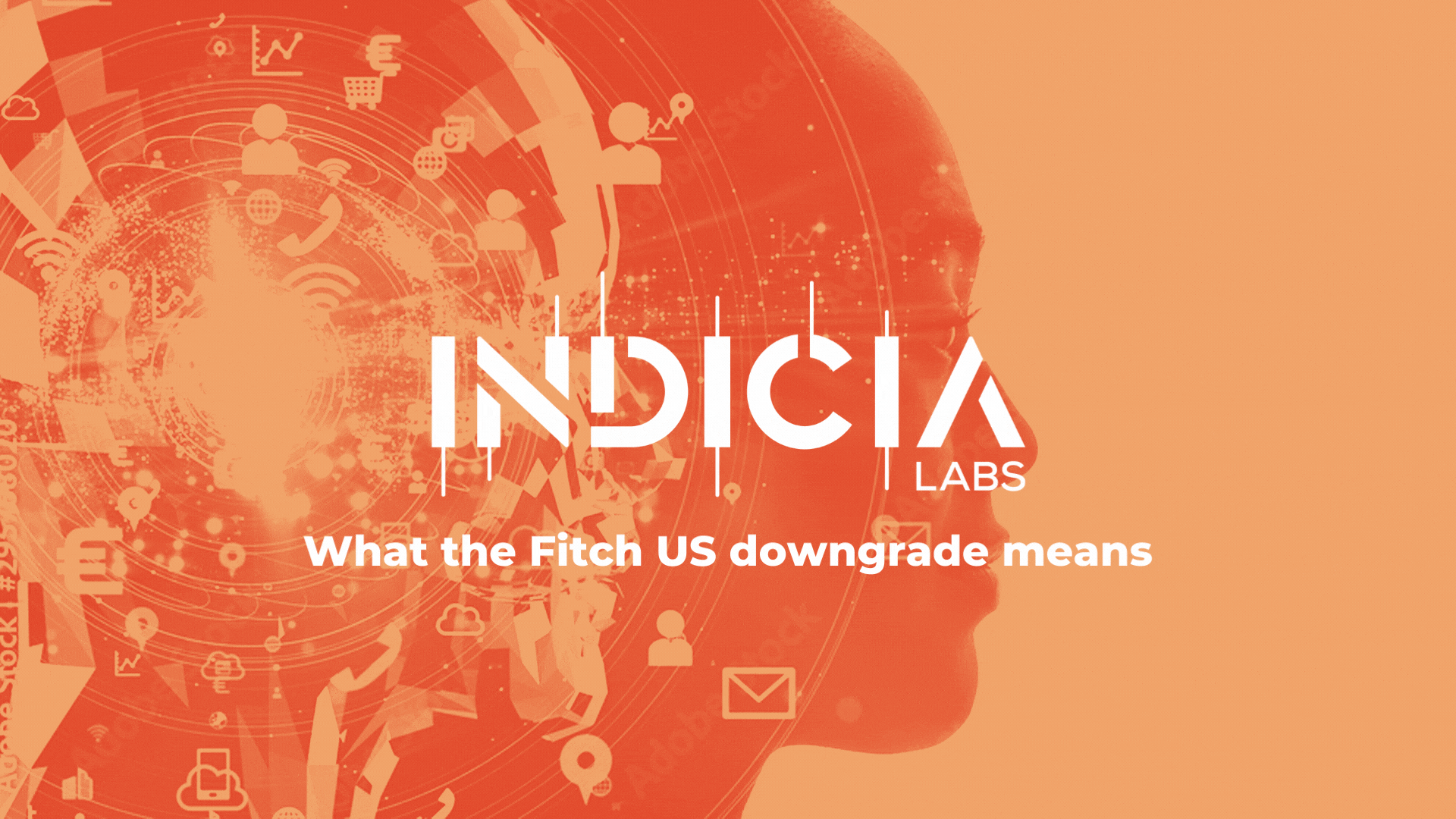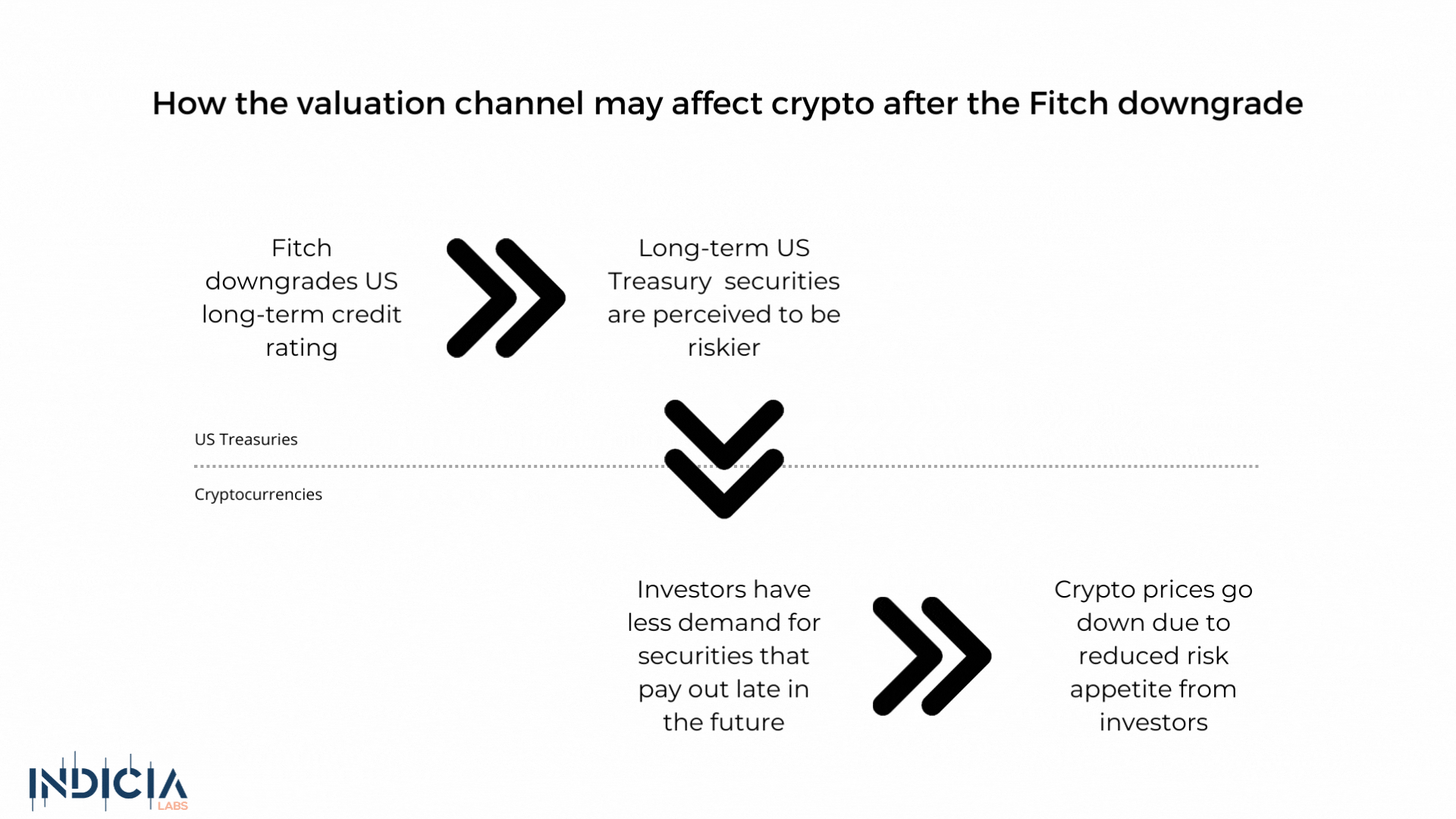Sophia’s Thoughts on the US Credit Downgrade
One of the biggest rating agencies downgraded the US credit rating last week. Normally, this would trigger shockwaves in financial markets. But all financial markets were eerily calm last week. What does this all mean for crypto?
These are Sophia's Thoughts:
Fitch downgraded the long-term credit rating of the US. It cited the repeated debt ceiling conflicts as one of the main arguments.
But most market participants claimed that this event should have little effect on financial markets.
Economic reasoning tells us that there are two different ways the downgrade could affect crypto. One is by triggering a flight-to-quality and the other is triggering a relative revaluation of long-term versus short-term assets. None of these two effects appear to be very relevant right now.
Our assessment from a few week’s ago remains unchanged. Something major needs to occur to push crypto out of the sideways movement it has been stuck in since April. The US credit downgrade does not appear to be the one event.
CNBC has put their trust in us and featured Indicia’s sentiment data in their August crypto market preview. Are you ready to do the same? Join us for free now.
🚀 Last week’s market performance
The market lost 1.4% over the course of the week. Meanwhile, Bitcoin (BTC) moved sideways and ended up only 0.4% down. One of the biggest winners of the week was Curve DAO Token (CRV). It bounced up 7% last week. This happened after it recovered most of the stolen assets after its major hack last week. The biggest loser of the week was Bitcoin Gold (BTG), which lost 21%. Over the course of the week, Sophia repeatedly flagged BTG as having some of the weakest fundamentals in the crypto market.
Sophia continued to be mostly neutral last week. But fundamentals appear to be strengthening. And sentiment has bounced back up, as we also highlighted in our last crypto sentiment update.
🧐 What is your crypto mood today?
In each Sophia's Thoughts newsletter, we ask about your crypto mood. Your response to this question helps Sophia get a better sense of the pulse of crypto markets. And this ultimately translates into better insights for you when combined with Sophia's AI models. Your data empowers Sophia to provide you with even better intelligence going forward!
🇺🇸 US Downgraded
Fitch, one of the three most recognized credit rating agencies, downgraded the U.S.’s long-term credit rating from its highest AAA level to its second-highest AA+ level. Fitch cited the “erosion of government” in the US as the reason for the downgrade. It also named the repeated times the US Government has come to last-minute resolutions when attempting to raise the debt ceiling. We talked about the most recent debt ceiling issue in a previous newsletter, Sophia’s Thoughts on the US Debt Limit Issue.
Fitch Downgrades the United States’ Long-Term Ratings to ‘AA+’ from ‘AAA’; Outlook Stable (Fitch)
Why the US Credit Rating Was Cut and What It Means: QuickTake (Bloomberg)
Fitch just downgraded the U.S. credit rating — how much does it matter? (NPR)
The development comes almost 12 years after S&P, another one of the big three rating agencies, first downgraded the US back in August of 2011. Back then, the US had just come out of the global financial crisis. The US Government barely avoided default after an intense debt ceiling negotiation. The day the S&P downgrade was announced, the stock market in the US lost 7%.
This time around, the market reaction has been much more muted. The stock market in the US declined by about 1% when the Fitch downgrade was announced. Around the world, stocks lost around 2%. Bitcoin continued its sideway swing. And even the assets that would have been naturally most affected by this development, the US Government bonds, had no noticeable immediate reaction to the news.
Bitcoin Sees Little Boost From Fitch Downgrade, Slumps on Binance Contagion (CoinDesk)
Market Reaction to the Fitch Downgrade: Meh (The Wall Street Journal)
📣 What are people saying?
Many experts have given their two cents on what this downgrade implies. First, US Treasury Secretary Janet Yellen stated that downgrade was “entirely unwarranted”. She continued to claim that it was puzzling considering the strength the U.S. economy has recently shown.
JPMorgan CEO Jaime Dimon had similar sentiment to Janet Yellen saying that “it doesn’t really matter much. [Because] the markets decide, not the rating agencies who make these big decisions”. Even legendary investor Warren Buffett said that “there are some things people shouldn’t worry about. This is one”. Most experts seemed to agree that the US downgrade may have little impact on traditional financial markets.
But some voices argued that the development may be good news for crypto. Primarily, because the downgrade accelerates the unwinding of the world economy’s dependence on the US Dollar. Gordon Grant, head of sales and trading at Genesis, told The Block that “with increased U.S. Treasury borrowing, interest costs higher, and funding needs rising, the need for a hard money alternative starts to be appreciated”. Michael Casey, CoinDesk’s Chief Content Officer, claims that the downgrade “underscores why Bitcoin and other open monetary systems matter”. Still, the crypto market did not showcase signs that it was benefitting from the development.
⤵️ How can the downgrade impact crypto
To understand how the downgrade may affect crypto, we need to dig into the economics of what just happened. There are two different ways through which the downgrade could have an impact on crypto.
First, the downgrade may impact investor confidence in financial markets. The US Government is the issuer of what is considered to be one of the safest financial investments in the world: US Treasuries. These are debt securities that promise a stream of cash flows over time, guaranteed by the ability of the US Government to make good on the payments. The downgrade implies that the US may not be as perfectly capable to pay these cash flows as was thought prior to the downgrade.
A deterioration of faith in the US Government’s ability to pay the debt due on US Treasuries can have a wide-ranging impact. That’s because it affects sentiment. Sentiment measures how confidently investors feel about investing in risky securities. If what investors perceived to be the safest securities in the world are not really as safe, then what does this imply about all other risky securities? When such events happen, investors tend to withdraw from risky securities and move into safer securities. Such a flight-to-quality could have detrimental effects on crypto, which is arguably one of the riskiest investment classes that exist.
When S&P downgraded the US back in 2011, investor sentiment took a real hit. Investors moved away from stocks and flocked into Gold, driving its price up. This is not what we’re seeing right now. So the flight-to-quality effect appears to be minor right now. This is consistent with the opinions expressed by Warren Buffett and Jamie Dimon.
However, there is another channel that may end up affecting crypto after all: the valuation channel. The downgrade by Fitch implies that all long-term investments are now perceived to be riskier than they were before the downgrade. That’s because the US Treasuries serve as a guideline for what is risky and they are now themselves perceived to be riskier. Investors are less likely to have an appetite for riskier securities. That may drive down the prices of long-term securities.
We have already seen the valuation channel at play since the Fitch downgrade. The valuation of 10-year Treasury Notes has declined by around 0.5%. The Nasdaq Composite index lost almost twice as much the day the Fitch downgrade was announced than the S&P 500 index or the Dow Jones Industrial Average. Unlike the latter two, the Nasdaq Composite index primarily reflects the valuation of tech stocks. These stocks generate most of their cash flows far in the future and are thus more likely to be affected by the valuation channel.
Crypto securities may be affected by the downgrade through the valuation channel because, just like tech stocks, they also promise cash flows late in the future. This may explain why the crypto market moved down last week.
However, many investors trade crypto speculatively without necessarily considering the very long-term cash flows that a crypto project may offer (ahem, the Ripple decision). The valuation channel may most likely impact long-term investors in crypto projects, such as venture capital firms. But VC investing in crypto has already declined significantly since the FTX fiasco and the collapse of Silicon Valley Bank.
So, all in one, we are of the perspective that the valuation channel may only play a minor role for crypto going forward. The US downgrade by Fitch does not appear to be the event that moves Bitcoin (and crypto) out of the 30k trap we highlighted in our previous Sophia’s Thoughts.
👀 What else is going on?
Paypal launched its own stablecoin (PYUSD). Paypal is looking to harness the power of blockchain technology to make payments faster and cheaper. Sentiment does not appear to be overly positive about the PYUSD launch.
I Have 1M Questions About the PayPal Stablecoin. Here Are 5 (CoinDesk)
PayPal Launches a Stablecoin in Latest Crypto Payments Push (Bloomberg)
PayPal’s stablecoin faces questions about usefulness, gas fees and old tech (The Block)
Curve Finance has made a significant recovery after last week’s hacking incident, recovering 73% of the stolen funds. The price of Curve’s native token CRV has moved up as a result.
A new development in staking called liquid staking tokens (LSTs) is making headlines. LSTs allow investors to both stake and trade their pledged Ethereum, resolving a well-known liquidity challenge. This innovation enhances flexibility and trading options. Binance reports that LSTs now dominate the DeFi sector, accounting for 37.1% of the ETH staking market.
Indicia Labs does not provide investment, tax, or legal advice. You are solely responsible for determining the suitability of any investment, investment strategy, or related transaction based on your personal investment objectives, financial circumstances, and risk tolerance. Indicia Labs may offer educational information about digital assets, which may include blog posts, articles, third-party content, news feeds, tutorials, and videos. This information does not constitute any form of advice, and you should not rely on it as such. Indicia Labs does not recommend buying, earning, selling, or holding any digital asset and will not be responsible for any decisions you make based on the provided information. Any content provided by Indicia Labs may contain errors, inaccuracies, or outdated information and should not be relied upon for making any investment decisions and Indicia Labs and its affiliates hold no responsibility for the accuracy of the provided information or content.
As with any asset, the value of digital assets can fluctuate, and there is a significant risk of losing money when buying, selling, holding, or investing in digital assets. Consult your financial advisor, legal or tax professional regarding your specific situation and financial condition, and carefully consider whether trading or holding digital assets is suitable for you.
Indicia Labs is not registered with the U.S. Securities and Exchange Commission and does not offer securities services in the United States or to U.S. persons. You acknowledge that digital assets are not subject to protections or insurance provided by the Federal Deposit Insurance Corporation or the Securities Investor Protection Corporation.






